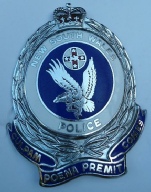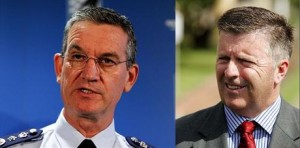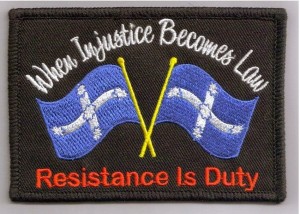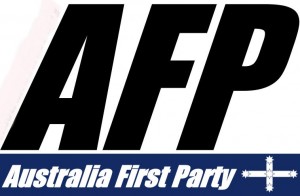Australia First Party in New South Wales has been recently targeted for disruption by the ‘Counter-Terrorism And Special Tactics Command’ of the New South Wales Police Force.
The party found itself being disrupted by an agent recruited out of the party in 2012 and who operated down to the Federal election of September 2013.
The party noted that the operation was managed by either the Community Contact Unit inside the Operations Group, or the Terrorism Intelligence Unit of the Anti-Terrorism And Security Group – of that Command. We concluded – for reasons we will shortly give you – that it was the Terrorism Intelligence Unit which was responsible.
It is hardly necessary for an organisation to be ‘terrorist’ in any way to find itself the subject of such an operation. Quite the contrary.
In fact it is rather obvious that Australia First Party was judged not to be a terrorist organisation! Small mercies! However, the Counter Terrorism political police investigate and disrupt organisations in the fashion of the former corrupt Special Branch police organisation, if they are any challenge to, or any substantial nuisance towards, the dominant liberal-globalist parliamentary parties and the economic system which they serve. It is as simple as that. Rather than direct themselves towards Jihadi Muslim terrorists of which there are plenty, the political police prefer to expend resources to disrupt Australian patriotic organisations.
It is a matter of record that in October 2011 the Australian Security Intelligence Organisation (ASIO) revealed an interest in groups it called “nationalist”, “racist” or “far right”. If earlier ASIO statements are a guide, this interest is generated because such groups are a challenge to the planned future of Australia – as part of Asian trade zone. In other words, there is a political economy to political policing.
A theory of disruption
That political police disrupt patriotic groups was effectively admitted some years ago by a major article in the New South Wales Police publication, Policing Issues And Practice Journal. A very detailed admission was made in a February 2007 article authored by Senior Constable Andrew Minney. It is noted that Andrew Minney was recorded as a member of the Strategic Intelligence Unit of the Counter-Terrorist Co-Ordination Command. It would seem that his unit was renamed the Terrorism Intelligence Unit and the Command generally renamed to the current title. These minor facts may tend to imply that what was done in the past would have been done in the recent-present and by the same political police unit.
We note that senior Constable Minney provided historical perspective to his analysis and that he discussed two specific classes of organisation of interest to the Counter Terrorism Command. These were “Nationalist Extremist” and “Racist Extremist” groups. He wrote:
“In Australia, the growth of NERE groups peaked in the late 1990s in response to the 1996 uniform national gun legislation and an upsurge of interest in the policies of the political party, One Nation. Since 1999 NERE groups have generally been in decline due to legal problems, a shift of supporters to more mainstream politics, conflicts within and between groups..”
But more ominously and of concern, he referred to:
“effective disruption by authorities.”
A member of Australia First has previously analysed Minney’s article:
http://home.alphalink.com.au/~radnat/politicalpolice.html
When a political policeman talks of “effective disruption”, he assumes his moral right to do it and by speaking openly – does not seem to care that the truth was told.
Australia First Party, named as it was in Minney’s 2007 article, assumed that what was done once, would be done again. The party took certain precautions. We may reject Minney’s labelling of us, either as nationalist or racist extremists – as propaganda. However, the political police’s labelling of us is simply part of their process of dehumanising and de-legitimising our movement and making us an appropriate target (sic) for programs of disruption in the eyes of ordinary police and the general public.
Effective disruption means using agents. The recruitment of agents from within a group is even more effective than sending one in. In the former case, the agent begins with real and personal knowledge of the players and some of the issues upon which his activity builds. In our case, the agent had underlying ‘criticisms’ of Australia First based upon his experiences (chiefly) in One Nation; these ‘experiences’ taught him that a certain model of party (as we shall explain to you) was always the way to go. The agent reasoned that all that was wrong with his former party One Nation – was ‘personalities’ and some bad management. He wanted Australia First to be a better version of his former party. So, he thought long about changing us, but realized it was next to impossible. It was at the moment that he was ‘discovered’.
How was this agent recruited?
It is not known to us whether the initial approach came from the political police or from the agent. Certainly we have a more than a fair idea of when the approach was made.
However, it is fairly clear that the first police involved were not ‘Terrorism’
officers, but ‘Task Force Raptor’ – which has been designated to investigate and prosecute crime arising from the activities of ‘Outlaw Motor Cycle Gangs’ (OMCG: in police parlance). Why?
The agent had family who were involved in an OMCG and it reasonably follows (i) they were already in legal trouble (ii) the Raptor police said they could get into trouble and would need special protection.
Howsoever it was arranged and in whichever order it was done, we reason that the agent understood the advantage and the Raptor police understood the dynamics involved. Whether the agent thought he was merely saving his family, or whether he thought that he could do a political good (sic) in undermining the leadership of our party, we cannot say. Nor do we care. A pimp is a pimp.
The affair also suggests that the political police already were monitoring closely the electoral and community activity of Australia First Party.
The agent – whom we will now call ‘John’ – was operationally passed over to the Terrorism Intelligence Unit.
We would add that it was a foolish thing for ‘John’ to do. He was now owned in every way and is still owned. In the circumstances described, t just isn’t what it’s cracked up to be playing spy for the political police for a payoff. You might get the payoff, but then you are on the payroll again whenever needed. You do what you’re told till the day you croak. And whatever be the situation with his family members, they too are targets for associates who may consider that they were involved in ‘John’s’ activities. Stupid.`
We would also add that it was a foolish thing for the Terrorism Intelligence Unit to do. Australia First Party now possesses very particular information which, if it was minded to be difficult and use its knowledge, could provoke undesirable results. Of course, we are not so minded. The political police have endangered their own agent and his family and so on. Stupid.
It is the intention of Australia First Party, for what it is worth, but also of necessity, to make a formal complaint to the Police Integrity Commission in New South Wales. To make Australia First Party a factor in the monitoring of ‘outlaw motorcycle gangs’ and to employ such concerns to affect political surveillance, hits new lows akin to the activities of the former Special Branch which disbanded by a Royal Commission and found institutionally corrupt.
What was the general plan?
The aim of these political police was to disrupt the Australia First Party particularly in Western Sydney in a number of changing ways over time, to divide the party overall (if possible) on a matter of ideology, to create disputes (if possible), to generally gather information on its activities and to render ineffective a number of party leaders (if possible). One singular effort was to blunt the 2012 Council elections’ campaign in the Hawkesbury area directed as it was against the populationist policies of the local Liberal-controlled Council and the open plan of the Premier of the State to ‘culture-bust’ the area – which was considered by him, “too monocultural”.
For the record, we inform our members and our supporters that the political police had some success with their many plans, but their overall gain was limited by the essential unity of the party and by the determination of the core leaders to address in a forceful way a number of irritants caused by the agent.
It was fairly understood by the Terrorism Intelligence Unit that the New South Wales section of Australia First Party was focused towards activities in Western Sydney in 2012 / 2013.
This truism meant that it had the ability to focus too. By limiting the party’s thrust there, it would blunt the party’s thrust overall. Logical. The political police also reasoned that the party had developed in 2013 a particularly aggressive campaign against the Chinese Trade Centre in Wagga Wagga. It could use indirect means against this effort – and interestingly, this was done. This Trade Centre campaign had deeply affected the Liberal-National politicians of the area and had assailed the direction of Chinese imperialist takeover of Australian resources, something encouraged by our political and business elites. Attempts were made to weaken this campaign. We understand.
What ‘lines’ did the agent push?
Since the motive of ‘John’ to dissent against the party was not known at the time and could not have been readily seen, he was first thought to have been an undigested ‘conservative’ drawn from the former One Nation party raising issues against the party’s positions, but in some sort of ‘sincere’ way. This was the party’s mistake. Because he was a friendly fellow (aren’t they all?), it was initially said by a couple of members who heard him challenged over certain remarks, that he was being treated too aggressively and eventually it was even said by one or two that he was “being treated unfairly”. That was to the advantage of his controller. Once the truth was determined, the film of his activities could be run into reverse and the ‘line’ of the political police came to be understood by all, even those who were first deceived. In other words, it is certain ‘ideas’ that have a negative value and they may be of advantage to an operative who seeks the destabilization and misdirection of a nationalist-minded party. It happens that these ‘ideas’ are all things long-repudiated by us.
So, let us review for our members and supporters what ‘John’ said. I doing so, we do not intend to broadcast his ‘line’ (sic) beyond the very general. And we hardly deal with everything that this agent said and did.
1. ‘John’ said that Australia First should be a party made “palatable” to the voters and that its activities and ideological views didn’t do that. He said that the whole of idea of a party is to get votes and that anything or anyone who gets in the way of that – has to go. The party’s aim is to get elected to parliament, he added.
Australia First Party has very developed views on these subjects and set them down in a major booklet – The Party of The Nation.
We shall only say here that the party’s role is a lot wider than just contesting
elections. It is to build a community based political organisation to contest for power – and not just for parliamentary power either. We aim to win and rescue the Nation from being part of an Asian trade zone. We do not want to play the games run by various nationalist and patriotic movements for over 20 years, those sure paths of failure. All of these movements played the ‘get into parliament’ game. We say that is not enough.
Our stand on these questions upset this ‘John’ to the point of rage long before he became an agent and it was a major thrust of his campaign as an agent.
Conclusion: the Terrorism Intelligence Unit is quite happy to see nationalist-minded groups centre their activities around fruitless quests for mass voting scores with the elusive hope that many of its men and women will enter into the various parliaments and win the Holy Grail – a ‘majority’ in such institutions. They are more than pleased if nationalists spend their time designing clever electoral programmes and recruiting or perfecting ‘good candidates’. All of these things sum up as delusional politics and this is what the political police peddle to us as ‘our method’. In fact, they fear the community based strategy that Australia First Party would seek to develop because it builds the struggle against globalism in schools, universities, unions, councils, community associations and various social sectors angered at the ravages of globalism and subordinates electoral work to the construction of the movement. The mainstream method favoured by ‘John’ is the endorsed line of the political police. You choose.
2. ‘John’ said that the party’s ideology was a “dangerous undertow” that should be thrown away in order to attract the voters. It was said that the various statements of Australia First were either too complex a set of notions for “ordinary people” to grasp, or that they were so outside the realm of mainstream reality to be “nonsense” and “rubbish”.
Our party says that the ideology and politics of liberal globalism cannot be answered by an electoral programme alone. It requires a counter faith to inspire people into action and to mold a resistance force. That is non negotiable logic.
Conclusion: the Terrorism Intelligence Unit sought to weaken Australia First Party by removing its very reason for being, its essential tools to actually craft a programme for electoral and community action, its very means to guide its activists and explain its challenge to liberal globalism. If members could be convinced that the essentials of the party were irrelevant to ‘success’, the party would disintegrate. Clever.
3. ‘John’ said that the mass media was essentially unfriendly to the party only because of our “hard” nationalist positions and the “attitudes” of our leaders towards it. It was said that if we selected new leaders “who were friendly to the media” and who espoused a more mainstream view of issues, we would win good publicity. We would then do well in elections.
Of course, as any good former member of One Nation should have known, the media is not some benign institution ready to favourably report patriotic people if they appear reasonable and friendly. Former One Nation member Scott Balson, in his excellent exposure work Murder By Media: Death Of Democracy, documented the various campaigns of media against that party. The One Nation party was misrepresented, its leaders belittled and lied about, factions within it promoted and oppositions from the outside incited against it.
The media is owned by those who own the state. The media functions as a ‘ministry of propaganda’ of the state.
Past a certain point, part of the media (and definitely not its core parts such as the big city papers and other print journals) can be generally influenced to represent our cause fairly and properly. Our party has some experienced hands who understand its multiple tricks and we do not intend to sack them because the journalists and their editors don’t like them. As a rule we do not give interviews to core media; there is no sense.
Conclusion: the Terrorism Intelligence Unit sought the removal of the party’s leaders and the placing into the governance of the party anyone less aware of the media’s methods. From there, further attacks could possibly be launched – even in tandem with compliant media agents – to try to convince the party to neutralize the second set of leaders and choose others even less ‘confronting’. By these methods, the party itself could be rendered harmless and its ideals cast aside in the quest for ‘respectability’.
4. ‘John’ said that the party’s activities against the Chinese Trade Centre scheme in Wagga Wagga in 2013, particularly the exposure material composed by the party on its national and Riverina websites, was “unpalatable to the voters” (once again that phrase), in tone and content. It was also said to be “irrelevant” to what really concerned the voters.
Of course, the derailing of this great campaign, one which finally sank the entire project in fact, was absolutely in the interest of the political police. If the party had slackened in its thrust, it would have weakened its election campaign anyway and would have been seen to sell out its principles. It would have disappointed its allies in the struggle against the Trade Centre. Naturally ‘John’ said that nothing would come of the campaign anyway. Sadly for the political police – we won that contest and sank the Centre.
Conclusion: the Terrorism Intelligence Unit sought to break the damaging attacks launched by the party upon this Centre project and to weaken the united front that came into being against it. In that way, the political police reveal themselves as an essential part of the political economy of globalism – bluntly, as tools of the moneyed traitor class. Whose interests are served? The traitors or the Australian People?
The tangled agendas of the dirty tricks campaign
The activities of ‘John’ also showed themselves in a final classic example of
how a political police dirty operation works. It is the presence of seemingly ‘opposite’ lines and activities run at the same time that proves the existence of the hidden hand.
During the Federal election campaign of 2013, one Lex Stewart appeared as a candidate for the Palmer United Party in Riverina. As one of the wreckers of the old One Nation party and someone who supported Hanson’s prosecution and imprisonment in 2003 (something he is very proud of), Stewart was in favour of the Chinese Trade Centre being built. He quickly took a hatred of Australia First Party and its Riverina candidate, Lorraine Sharp. Stewart threatened legal actions against our candidate, stalked her and another member at their homes home and finally assaulted her in front of several witnesses on a pre-poll booth in Wagga Wagga. Lorraine sought assistance from an Australia First Party officer to help her overcome this harassment. ‘John’ intervened to stymie the intervention of this party officer.
And simultaneously, ‘John’ pushed another plan. Readers should understand that the Pauline Hanson 2013 campaign for the New South Wales Senate was not something supported by Australia First. We have said for years that the Hanson of today is hardly the one of 1997 and that her victory in the Senate would have simply provided Tony Abbott with a safety valve for popular concern at his refugee policy. We said that as the election campaign was under way, ‘John’ tried to convince Australia First officers that we should “preference Pauline” in the Senate and reverse our stand. He caused negotiations to be entered into with a Hanson official who proposed “positions in the new One Nation” if Hanson was successful even as he acted to indulge the anti Hanson Stewart against Australia First.
It reasonably follows that it was a case of both sides against the middle. As it was, the party overcame Stewart and refused to preference Hanson.
Stewart was certainly a distraction for our Riverina activism as was the issue of preferencing Hanson, a sideshow for the party generally in New South Wales. Yet the frictions of these matters were designed by the political police to turn people against each other.
We are pleased that when the dust settled, Stewart was back in the shadows, even if ready for his next provocation and Hanson was resigned to quitting politics. And we were moving on.
The counter thrust
In building an Australianist party, the activities of political police agencies have to be confronted. Many people who have joined organisations of the nationalist type over the last quarter-century have rejected the very notion that a secret-state exists in Australia. Their naïvety is used against them to blunder into activities that soon rebound against them – such as the taking of mainstream courses. It is also the case that groups have been infiltrated and agents have achieved prominence and led the groups to the rocks.
Naivety is sometimes used by political police agents who lurk in groups and accuse the leaders of being undemocratic, unfair, even paranoid, in their dealings with certain types of criticism. Some foolish people believe them. The ‘criticism’ is always that which challenges the very purpose of the organisation that the agent has been sent to wreck.
We know in recent years that infiltrations and wrecking operations have been run in Victoria against many community groups. Some of these campaigns have been waged by private inquiry agencies doing a job for the political police. That is new. It was clear that the ASIO-linked Liberal Party ‘Australians For Honest Politics’ was involved in damaging One Nation. A 2006-7 split in the old Australia First Party (which occasioned us to re-found the party) bore trace-signs of a dirty tricks operation, indeed this split occurred just as Constable Minney was reporting how “effective counter measures” had been employed against the broad movement. A national transport shutdown in 2008 was destabilized in odd ways suggestive of political police activity. Some union campaigns have also been targeted. The State Intelligence Group in Western Australia threatened to load up and imprison young nationalists involved in protest activities in 2011. The list is endless.
Yet our many patriotic movements are generally registered parties and function to affect change by non violent means. None of this deters the political police from trying to disrupt them. This proves to us that the Australian state is no ‘democratic’ entity but some sort of soft dictatorship.
In a formerly internal Australia First Party document, Jim Saleam said:
“The nationalist movement has beaten down the impact of many agents and informers over the years. Creatures in New South Wales with colourful code names like ‘Basil’ and ‘Cabbie’ in the 1980’s, some of the north-shore Sydney One Nation leadership in the 1990’s, and many more acted against patriotic groups and were exposed.
It so happened that I was involved, as were many other members of our party, in ‘National Action’ when we were forced to fight against the corrupt Special Branch gang in the 1980’s. We have seen a lot.
The Special Branch made serious errors in its struggle against the nationalists of those times; when a Royal Commission into policing in this State was pushed for a reason to dissolve the Special Branch, an organisation they knew was not even to their own interest, they cast about for incriminating material. Accordingly, some of our information about theft of Branch funds was used to bring the Special Branch down.
In fact, it was the struggle between National Action and the Special Branch that created much of this material and other material. We are proud of that. We take an interest in ‘intelligence’ issues because we must. Regrettably, the secret state is real and the public state of major-parties and parliaments is only part of the force we fight. And we must fight it without respite.”
Australia First Party has certainly overcome the recent operation put against it. Its members harden themselves for the next round of this unfortunate dirty war. There will most certainly be another ‘John’ and another and another, with different lines and subtle ploys. The next one will be discovered we hope far more quickly and formally expelled – and his game advertised. Australia First Party has now resumed its struggle.



